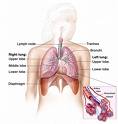MESOTHELIOMA 
Custom Search
For those diagnosed with mesothelioma, an asbestos-related cancer of the lining of the lung (pleura) or the lining of the abdominal cavity (peritoneum), finding a credible source of information about the disease itself and the medical options available, is of the highest priority. After years of research and synthesis of information, we have assembled a web site and packet for patients and their loved ones. We hope you find this web site helpful. A mesothelioma diagnosis can be overwhelming, and we are here to answer any questions you might have, and to help you take the steps necessary to find the options that are best suited to your individual needs. Mesothelioma is a form of cancer that is almost always caused by exposure to asbestos. In this disease, malignant cells develop in the mesothelium, a protective lining that covers most of the body's internal organs. Its most common site is the pleura (outer lining of the lungs and internal chest wall), but it may also occur in the peritoneum (the lining of the abdominal cavity), the heart, the pericardium (a sac that surrounds the heart) or tunica vaginalis. Most people who develop mesothelioma have worked on jobs where they inhaled asbestos particles, or they have been exposed to asbestos dust and fiber in other ways. It has also been suggested that washing the clothes of a family member who worked with asbestos can put a person at risk for developing mesothelioma. Unlike lung cancer, there is no association between mesothelioma and smoking, but smoking greatly increases risk of other asbestos-induced cancer. Compensation via asbestos funds or lawsuits is an important issue in mesothelioma (see asbestos and the law). The symptoms of mesothelioma include shortness of breath due to pleural effusion (fluid between the lung and the chest wall) or chest wall pain, and general symptoms such as weight loss. The diagnosis may be suspected with chest X-ray and CT scan, and is confirmed with a biopsy (tissue sample) and microscopic examination. A thoracoscopy (inserting a tube with a camera into the chest) can be used to take biopsies. It allows the introduction of substances such as talc to obliterate the pleural space (called pleurodesis), which prevents more fluid from accumulating and pressing on the lung. Despite treatment with chemotherapy, radiation therapy or sometimes surgery, the disease carries a poor prognosis. Research about screenin tests for the early detection of mesothelioma is ongoing. |



